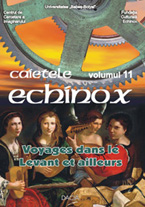El espacio y el viaje revelador en la literatura chilena del exilio. Geografias imposibles: exterioridad vs. espacio interior
The Space and the Revelatory Voyage in the Chilean Exile Literature. Impossible Geographies: Inner and Outer Space
Author(s): Andrada Fătu-TutoveanuSubject(s): Literary Texts
Published by: Universitatea Babeş-Bolyai
Keywords: Chilean literature; Isabel Allende; Luis Sepúlveda; Antonio Skármeta; exile; identity
Summary/Abstract: The voyage, main concept at an implicit level in the Chilean exile literature (the generation of Isabel Allende, Luis Sepúlveda, Antonio Skármeta and others) expresses in a symbolical form the constant need of the individual to recuperate through the artistic act his native space and the area of his identity. This voyage through mental spaces inscribes new maps, on which the space is fragmented in islands whose names are given by nostalgia, memory and by an act of re-creation. This literature tries to rebuild vertically and horizontally the geography of a country as it continues to exist only in the memory, an invented country, as Isabel Allende calls it, which persists beyond the authentic space, curved into an act of self-discovery and self-construction. As reality (initially forbidden) cannot sustain itself (when the contact is reestablished) against nostalgia, because it has brutally lost its innocence, the only possible native country resides in the language, a privileged space where the dynamic act of combining memory an invention takes place by drawing the new lines of a vital space. Out of the magic, protecting, circle, projected in a cruel no-man’s-land, the individual has to assume an inner re-building in order to find new roots in this mental, invented country, trough a revelatory voyage to a necessary but impossible geography.
Journal: Caietele Echinox
- Issue Year: 2006
- Issue No: 11
- Page Range: 72-77
- Page Count: 6
- Language: Spanish
- Content File-PDF

